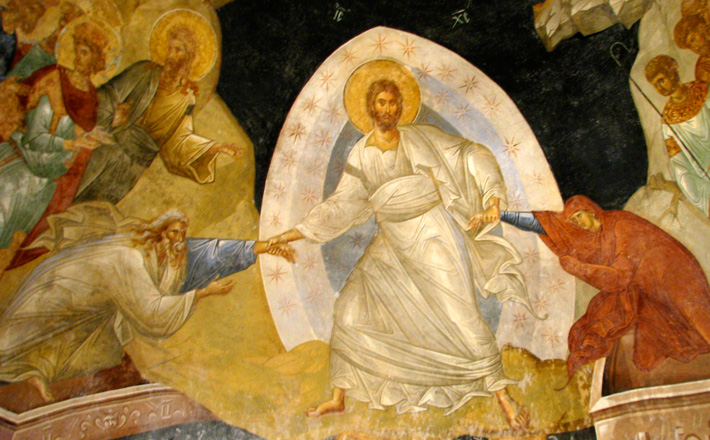Commentary on Job 19:23-27a
Reading Job from the perspective of the character evaluation given in James 5:11, other religious texts, and the popular imagination presents us with one version of Job.
Invariably, these versions of Job from outside of the book of Job bear a faint resemblance to the character encountered in the book.
Since most people only encounter the popular version of Job, preachers have an opportunity to broaden the perspective on Job with this reading. While the selected passage can easily reinforce the notion of the patient and understanding Job, preachers who reach beyond the limits of this passage can situate a fuller image of Job and therefore explore critical ideas of faith. Paying attention to Job as Wisdom Literature, a body of texts that challenge traditional thinking, is critical for interpreting this passage.
Chapter 19 occurs in the heart of the back-and-forth conversation between Job and his friends. Here, Job details the ways in which God’s actions have hurt him. His list represents an exhaustive description of Job shut out and shut down at every turn in his life (verses 10-19). A plea for understanding from his friends (verse 21) soon gives way to the realization that like God, Job’s friends stand as his persecutors (verse 22). To miss this charge that Job levels against both God and his friends would distort the reading of the chapter. To only pay attention to Job’s accusation against the friends and leave out his inclusion of God represents a misunderstanding of the book of Job. The firm stance that Job takes in the passage flows from his isolation and sense of unfair persecution.
In defense of his case, Job marshals the language of the court. He wishes for written and permanent evidence to document his case. The shift in the technology of writing between verse 23 and verse 24 from destructible book to more durable rock engraving shows the intensity of his desire to be heard both now and into the future. The protestation of his innocence and the unfairness of his treatment form the core of the words that Job wishes to regard for posterity. The grammatical form of the wish in verse 24 indicates the desire for a wish that may never be fulfilled. The book shows that Job recognizes that in taking God to task, the balance of power is stacked against Job (9:3-4, 13-22). Therefore, the permanent record forms one of Job’s legal refuges against God.
The second legal remedy that Job appeals to here lies in the figure of the redeemer (Hebrew go’el). Established to support vulnerable persons in the community, the go’el, a near relative, functions to protect individuals from undue physical and economic violence (Leviticus 25:25). While for most of the Old Testament the go’el is a human being (see Boaz in Ruth), Second Isaiah theologizes the function making God the go’el (Isaiah 41:14; 43:14; 44:6).1
With the “redeemer” as one of the attributes of God in mind, Christian readers can easily read verse 25 as an affirmation from Job that he will see God. Even more, the references to surviving beyond the corruptions of the flesh invoke the example of Jesus leading to the notion of Job standing in a post-resurrection encounter with the living Jesus. While the choice and placement of this verse in the libretto of Handel’s Messiah goes a long way in reinforcing post-resurrection interpretations, C. L. Seow points out that the Old Greek’s translation of 19:25b-26a as referring to “God’s raising of Job’s skin” marks a crucial start in the resurrection related interpretations of this verse. Early understandings of Job as seen in Old Greek appendix of 42:17 and the Testament of Job lay the groundwork for Christians as early as Clement of Rome to use 19:25-26 as a proof text of resurrection.2
Since the book of Job exists as more than what is written in the book itself, some preachers will be content to identify the go’el as God or even Jesus. However, the adversarial charges that Job lays out against God in the book make it quite unlikely that even in this notorious difficult verse to translate that Job wishes to see God as the one who vindicates him. The verses read consistent with the rest of the book if the go’el is understood as another divine being that can stand up to God. Norman Habel provides a solution that identifies the go’el as a different figure who after completing the task enables the vindicated Job the opportunity to see God. He translates 19:25-27:
I, I know my redeemer lives
And afterward he will rise on the dust –
After, that is, my skin is peeled off!
But from my flesh I would behold Eloah;
I, I would behold him.
My eyes would see him, not another’s –3
While preachers may find it difficult to engage the theological challenges of a plurality of divine beings and redemption from a source other than God, wisdom literature confronts us with these issues. To tame the voice of Job into theological orthodoxy remains too easy and deprives the faithful of the creative engagement with the issues that the book raises.
Job’s strident insistence of his innocence in this passage and other parts of the book stands as a remarkable example of self-certainty. While at times doubts appear in the book, strikingly Job remains certain about his innocence (9:15, 20, 28; 27:1-6; 34:5). The emphatic construction, the first pronoun plus the first person verb, stresses the knowledge of the go’el in verse 25 and the surety of his vision in verse 27. The catalogue of his innocence at times appears gratingly narcissistic (12:4; 29:2-25; 33:3). Job’s self-certainty stands against the confidence of his friends in the received traditions. Most persons of faith are socialized not to stand against tradition of any sort, particularly the traditions of the church and God, with one’s individual experience. Yet, ironically, those who dared to point to other paths, other ways of seeing and being, other modes of thinking have often been the ones to effect reform and progress in church and society.
Curious preachers should pay attention to the book of Job rather than to its tamer counterparts. In this book, Job does the unthinkable and stands up to God. Job’s stance consists not merely in the easy and all-too-common question as to why God sends natural disasters. Rather, Job raises the serious questions of who we understand God to be and how God relates to humans in the world.
For the most part, Job’s new experiences find the given answers inadequate to accommodate expanding ways of conceiving of God. It is not enough to say that Job questions God. Job interrogates the settled foundations of accepted theology and does so from the perspective of his expanded human experience. That the theological establishment amounted to the establishment in the ancient world allows William Safire to draw out broader implications of Job in his book The First Dissident: The Book of Job in Today’s Politics. Safire reads Job amidst the politics of revolt that characterized Vietnam War protests and Nixon era controversies; an era when the establishment was interrogated. Can Job’s daring claim to innocence, his insistence on his vindication from outside the establishment, and his belief that he will expose power be useful for today’s politics in church and society?
1 Norman Whybray, Job. (A New Biblical Commentary; Sheffield Phoenix, 2008), 102.
2 C.L. Seow, Job 1-21: Interpretation and Commentary (Winona Lake, Wis.: Eerdmans, 2013), 793.
3 Norman Habel, The Book of Job: A Commentary (Philadelphia: Westminster, 1985), 293.


November 10, 2013